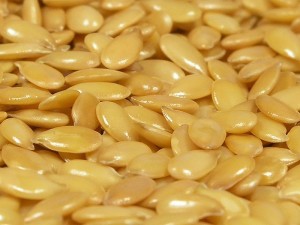
More evidence that low-calorie sweeteners are bad for your health
Studies show that artificial sweeteners can raise the risk of hypertension, metabolic syndrome, type 2 diabetes and heart disease, including stroke.

A diet high in seeds, particularly flax seeds, may help slow, or even prevent, the development breast cancer as you age.
That is a conclusion of a recent study by researchers at the German Cancer Research Centre (DKFZ).
The researchers examined blood samples from more than 1000 women who had been diagnosed with post-menopausal breast cancer over a three-year period. They were looking for a type of protective plant hormone (know as a lignan) called enterolactone.
Comparisons of the levels of enterolactone in the blood with the number of cancers that the developed in the women showed that women who had the highest levels of enterolacton had a 40% lower risk of the cancer spreading and of dying from the disease.
Several studies have suggested the plant compounds known as phytoestrogens that attach to receptors for the female sexual hormone estrogen in the human body protect against cancer
This study published in the Journal of Clinical Oncology shows that in women with non-hormone dependant cancer the right dietary components are significantly influential in slowing the disease and reducing the risk of dying from it.
The researchers went on to suggest that the protective effect of flax seeds may come from something beyond its hormone-like effects, though more study is needed to confirm this.
Scientists still debate over the benefits of phytoestrogens, such as lignans and isoflavones (found in soybeans) for cancer prevention, because of the potential for hormone-like compounds to accelerate the growth of hormone-dependent malignant tumours.
For this reason the researchers said they did not recommend taking supplements, but instead encouraged women to make sure their diets are rich in wholemeal products, seeds and vegetables – the sum total of which should provide all the beneficial phytoestrogens we need to stay healthy.
Earlier in the year the same research team identified a list lifestyle factors which significantly influence a woman’s risk of getting breast cancer. They note that things like family history of cancer, or starting menstruation at an early age are factors none of us can modify, these account for only around 37% of breast cancer cases. However factors such as taking hormone replacement therapy and lack of physical activity – things which women do have control over – account for between 30-37% of cases.

Please subscribe me to your newsletter mailing list. I have read the
privacy statement